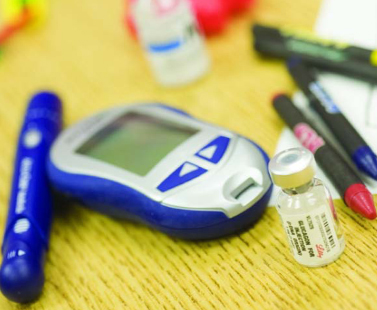USF creates $1.4 million Endowed Chair in Diabetes Research
Tampa, FL (Dec. 1, 2008) — Jeffrey Krischer, PhD, has been appointed to fill a new $1.4 million Endowed Chair in Diabetes Research at USF Health – another step in the university’s ambitious initiative to create a nationally prominent program in diabetes and autoimmune disorders.
The university-bestowed endowment will build upon the success of the Diabetes and Pediatrics Epidemiology Centers directed by Dr. Krischer, professor and chief of epidemiology in the Department of Pediatrics. Under his leadership, USF has become a preeminent force in international studies of the epidemiology of Type 1 diabetes and clinical trials for diabetes prevention and treatment. The incidence of Type 1 diabetes, epidemic among children, has doubled worldwide since the 1980s.
“The research in diabetes complements our other projects in rare diseases, many of which also have an autoimmune component and may share common etiological pathways,” said Dr. Krischer, who directs 50-plus researchers with expertise in developing and applying new technologies and informatics to medicine. “I believe we have the right combination of science and strategy to be able to eliminate Type I diabetes for the next generation.”
Dr. Krischer’s team has attracted a record total of $389 million in research funding to USF. His latest National Institutes of Health award – a $127.7-million TrialNet contract to coordinate worldwide studies that look for new ways to prevent and treat Type I diabetes – is expected to catapult USF into the top 50 U.S. medical schools in NIH funding. In addition to the TrialNet award, Dr. Krischer is principal investigator of a 10-year, $169-million NIH contract to lead the data coordinating and technology center for TEDDY, a study identifying environmental triggers of Type I diabetes.
Both TrialNet and TEDDY are being carried out on an international stage through NIH-sponsored clinical sites in the United States, Canada, Europe, Australia and New Zealand. None of these patient-oriented research sites are currently in the Tampa Bay region – something that USF wants to change.
“Without a doubt, Dr. Krischer’s research excellence has strategically positioned USF to create an integrated program for controlling and treating diabetes and aggressively working toward its eradication,” said Stephen Klasko, MD, MBA, CEO for USF Health and dean of the College of Medicine. “The Tampa Bay area has excellent physicians caring for children and adults with diabetes, but to advance to the next level of care we must create a world-class clinical research and comprehensive care facility for patients with diabetes and related complications. It would offer patients in our community the opportunity to be part of the science that leads to a cure.”
USF will use the Endowed Chair in Diabetes Research as a catalyst for private donations and additional endowments to support a campus-wide, fully integrated signature program in diabetes and autoimmune disorders. The university plans to begin recruiting an interdisciplinary team of basic, translational and clinical researchers, educators, physician-scientists and health care professionals needed to establish a multi-use clinical research center and diabetes education center at USF Health’s north campus.
“Such a center would provide patients with diabetes and related autoimmune disorders access to the same state-of-the art clinical trials that Dr. Krischer is overseeing globally,” said Abdul Rao, MD, MA, DPhil, senior associate vice president for USF Health and vice dean for research and graduate studies for the College of Medicine. “It would play a critical role in advancing the standard and quality of care in the Greater Tampa Bay area and beyond for patients suffering from diabetes and autoimmune disorders.”
Type I diabetes is one of the most common and serious long-term diseases in children and adolescents. It is a disease in which the body’s immune system attacks the cells that make insulin – a hormone that keeps blood sugar levels stable. Its treatment requires a life-long commitment to daily insulin injections and significant lifestyle changes.
– USF Health –
USF Health is dedicated to creating a model of health care based on understanding the full spectrum of health. It includes the University of South Florida’s colleges of medicine, nursing, and public health; the schools of biomedical sciences as well as physical therapy & rehabilitation sciences; and the USF Physicians Group. With more than $360 million in research grants and contracts last year, USF is one of the nation’s top 63 public research universities and one of 39 community-engaged, four-year public universities designated by the Carnegie Foundation for the Advancement of Teaching. For more information, visit www.health.usf.edu


